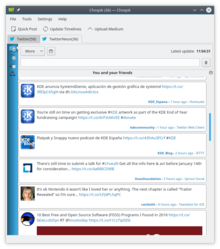types of software
Software components of a computer system have no physical presence, they are stored in digital form within computer memory. There are different categories of software, including system software, utilities and applications software. Software can also be described as being either generic or bespoke.
System software is the software used to manage and control the hardware components and which allow interaction between the hardware and the other types of software. The most obvious type of system software is the computer's operating system but device drivers are also included within this category. Systems software includes the programs that are dedicated to managing the computer itself, such as the operating system, file management utilities, and disk operating system (or DOS). The operating system manages the computer hardware resources in addition to applications and data. Without systems software installed in our computers we would have to type the instructions for everything we wanted the computer to do!
Utility software is software such as anti-virus software, firewalls, disk defragmenters and so on which helps to maintain and protect the computer system but does not directly interface with the hardware.
Applications software (also known as 'apps') are designed to allow the user of the system complete a specific task or set of tasks. They include programs such as web browsers, office software, games and so on. They are usually the reason you bought the computer system in the first place and aren't concerned with the management or maintenance of the system itself.Application software, or simply applications, are often called productivity programs or end-user programs because they enable the user to complete tasks such as creating documents, spreadsheets, databases, and publications, doing online research, sending email, designing graphics, running businesses, and even playing games! Application software is specific to the task it is designed for and can be as simple as a calculator application or as complex as a word processing application. When you begin creating a document, the word processing software has already set the margins, font style and size, and the line spacing for you. But you can change these settings, and you have many more formatting options available. For example, the word processor application makes it easy to add color, headings, and pictures or delete, copy, move, and change the document's appearance to suit your needs.
Any individual software package, whichever of the above types it falls into, can be either generic (or 'off-the-shelf') or it can be bespoke(custom-built). Generic software is mass produced with the intention that it will be used by a wide variety of different users in a range of different situations. Bespoke software is created for a specific purpose which will be used in a known environment.
Often generic software is used when there is a package available that meets the needs of the user. Because it is used by many more people the cost of creating it is spread over a greater number of people or organisations and so the cost to the individual is much lower. It also has the advantage that it is available immediately there's no waiting time involved while the software package is designed, created and tested. Bespoke software has the advantage that it can be tailor made to exact specifications but it significantly more expensive and will take time to create.


Comments
Post a Comment